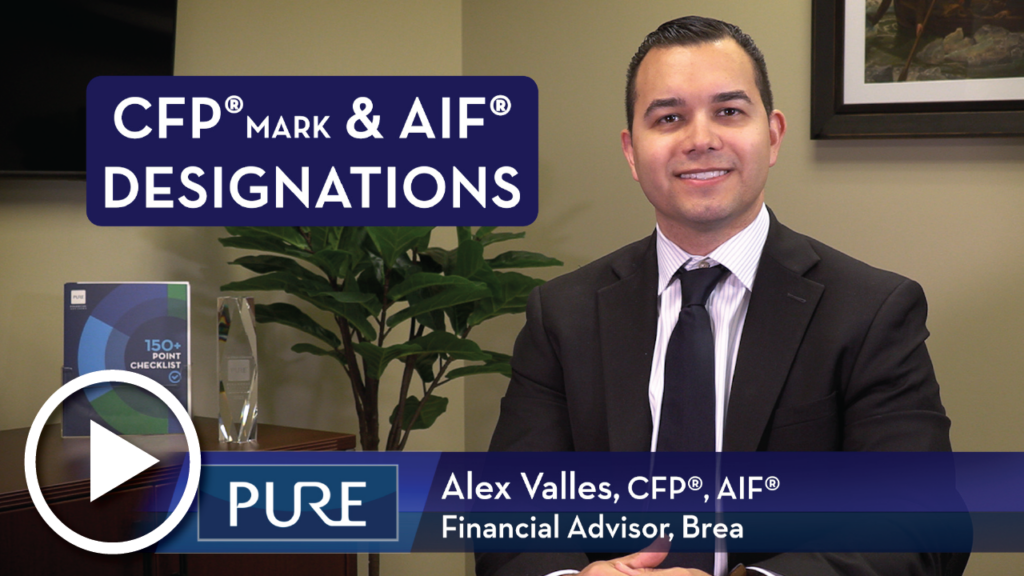Looking for a financial advisor? Someone to bounce ideas off of or double-check what you hear from friends or read about online? Many people are in the same position, struggling to manage their finances and just not sure what the next steps are. According to the National Financial Educators Council, in 2023, U.S. residents lost an average of $1,506 due to a lack of knowledge about personal finances¹. Think about how much money you could lose over your lifetime because you lacked the financial knowledge needed for wealth management.

This isn’t just about money, it’s about your life, which can be complex and your financial situation can be even more complicated. Whether you’re nearing retirement, in retirement, had a life-altering event, or just need advisory services, experienced financial professionals can help you get the right information so you can make the best decisions for your financial future.
So, before we get into the different types of advisors out there. Your first choice in selecting an advisor should be competency. Are they going to be able to give you the advice that you want? You worked hard and did a good job of accumulating some wealth, so you should want to work with an advisor who can give you the advice that you need to make sure they do the right things for you. You want an advisor who will save you money in taxes, create the income that you need, and coordinate everything else you need for retirement.
Now, let’s see how your financial advisor can be compensated.
Compensation
Fee-Only – A financial advisor can be paid directly by you as a fee-only financial advisor. This means the advisor or firm receives compensation from fees clients pay for their services. You will want to ask how the fees are calculated. This can be hourly, on a retainer, or based on the assets being managed.
Commission-Based – A financial advisor can be paid on commission. Commission means that they are paid by the products that that advisor is selling to you.
A financial advisor can be paid both ways. However, if they’re being paid, you will want to understand if there’s any conflict of interest for you.
You will also be responsible for charges incurred at whatever custodian your investment advisor uses to hold your funds. These may include trading costs, annual account fees, trade confirmation fees, or other expenses you will want to confirm with your advisor.
Ethical Duty
Next, you should make sure that your financial advisor is an investment fiduciary.
But, what is a fiduciary? A fiduciary is a person or a legal entity, like a bank or a brokerage firm, that’s legally required to act in the best interest of a client in situations requiring total trust honesty, and good faith.
Anyone can be a fiduciary, but the most common example of a fiduciary is a trustee of a trust. But corporate officers are also fiduciaries to their shareholders. Attorneys are fiduciaries to clients, and some, but not all financial advisors are fiduciaries to clients.
What is the fiduciary duty? The fiduciary duty is the highest standard of care. It’s acting in the best interest of the client or beneficiary in all situations, even if those decisions are contrary to your interests. For financial advisors, this may mean giving advice that results in no compensation. The reason that this is important is because not all financial advisors are fiduciaries. And in fact, financial advisors aren’t required to be fiduciaries.
Before you decide on a financial advisor that you want to work with, you want to understand whether they’re held to a fiduciary standard or not. Questions you might want to ask are surrounding the type of products they recommend, the type of advice they give, and how they’re compensated. If you ask an advisor if they are fiduciary and they are a fee-only advisor, it’s likely that they are also a fiduciary. A commission-based advisor is most likely not a fiduciary. Important questions to ask before making those decisions.
What Do They Do?
So, by now you know that you want to deal with an ethical, experienced, and educated professional who does not have conflicts of interest to help you reach your financial goals, but how do you know what to look for if you don’t know what an advisor does? Let’s go through that.
Now, what does a financial advisor do?
Cash Flow Planning

A financial advisor should first put together a plan to help you understand what’s coming in and going out, not just today, but well into the future. All financial goals require some management of your cash flow whether that be managing debt, buying a home, planning for retirement, whatever it is, this should be the first step in the financial planning process.
Here are just a few of the questions to ask yourself:
- Do you have clearly defined retirement goals and objectives?
- How much money do you need to create the retirement income that you are accustomed to?
- Are you familiar with some of the various strategies to minimize your taxes?
- Are you doing all you can to increase your income?
- What’s the minimum amount of risk you can take and still achieve your financial goals?
Tax Planning
They should also work on tax planning. Reducing taxes is an essential piece in preserving your retirement plan. Tax laws can be confusing, and little mistakes lead to larger tax issues. Each year millions of people overpay in taxes without even knowing it, leading to a lower retirement income. Tax planning is critically important to make sure that you are paying the lowest reasonable taxes today. More important than today, paying the lowest reasonable amount of taxes over your lifetime.
Financial advisors should offer retirement tax consulting that pays critical attention to tax liability during your financial planning process to minimize problems and maximize tax deductions.
Other Aspects of Life
A financial advisor should be looking at the other aspects of your life. Health care, long-term care, insurance, estate planning, maybe even inheritance planning. All these aspects of your financial life should come together in your financial plan.
Investing
Your financial advisor should also be looking at your investments. Your investments need to fit the rest of your financial plan and everything else you have already put together.
Are They Qualified?
A financial advisor should be a financial professional with the education and experience to do proper financial planning for you. Some credentials include the CFP® credential, AIF® designation, and Accredited Asset Management Specialist℠ designation, among many others.
In the field of financial planning, the CFP® designation is one of the most recognized standard credentials that ensures those who hold it have met specific requirements for ethics, education, experience, and examination. To use the CFP® credential, the financial planner must complete the CFP® Board’s comprehensive examination which tests his or her knowledge on several key financial planning topics. The applicant must also have three to five years of related experience, voluntarily ascribe to the board’s code of ethics, and complete 30 hours of continuing education every two years about such relevant topics as estate and retirement planning, investment management, tax planning, and insurance.
Another highly qualified and known designation is the Accredited Investment Fiduciary. The AIF® designation, administered by the Center for Fiduciary Studies fi360, certifies that the recipient has specialized knowledge of fiduciary standards of care and their application to the investment management process. To receive the AIF® Designation, the individual must meet prerequisite criteria based on a combination of education, relevant industry experience, and/or ongoing professional development, complete a training program, successfully pass a comprehensive, closed-book final examination under the supervision of a proctor and agree to abide by the Code of Ethics and Conduct Standards. Six hours of continuing education are required annually to maintain the designation.
There are other financial industry designations, which are also highly respected, to read more about financial planning designations and certifications held by advisors at Pure Financial, click here.
Ask to See Their ADV
The Form ADV is submitted to the SEC by investment advisory firms. You will generally be presented with Part 2A of Form ADV, the portion that describes the firm’s background, types of services offered, fees, charges, and potential conflicts. A supplement (ADV 2B) may be presented for any Investment Advisor Representative meeting clients on behalf of the firm.
You can also search by firm name at the SEC Investment Advisor Public Disclosure site.
Not all financial advisors are registered as investment advisors. Those who only sell commissioned products and do not perform fee-based services may be registered as a representative of a Broker Dealer at FINRA. You can download a firm or individual “broker check” report for those who do commissioned business at FINRA’s Broker Check site.
Is It Worth It?
Finally, is it even worth it to hire a financial advisor? Well, that answer is not simple, it’s going to be different for everybody. And we highly recommend that you take what you learned above and get a free financial assessment. An assessment is going to look over every aspect of your financial life, what that financial advisor can offer, and the cost of that financial advice.
So, once you’ve done all that, then you can decide whether or not that financial advice is right for you.
But before you decide to do it yourself, think about these questions:
- Are you good at rebalancing?
- Can you manage your taxes and save yourself money?
- Will you grow your investments?
- Do you have enough financial knowledge?
If you answered no to any of the questions above, then let’s look at the questions to ask when choosing a financial advisor:
- Are they a fiduciary?
- How will they be compensated?
- What services do they offer?
- Will they maximize your tax savings strategies?
- Are they qualified?
- How often will I meet with them?
Also, one more thing to consider before choosing a financial advisor is proximity. You might want to find a financial advisor near you. Or if you’re not worried about that, most financial advisors can give you advice virtually, over a Zoom call. Whatever your preference, you’ll want to make sure your financial advisor meets your needs.
Choosing a financial advisor can be a big decision, but now you have all the information needed to make an informed one.
Want to know more about Pure Financial Advisors? Click here.












